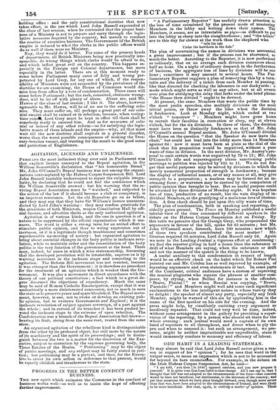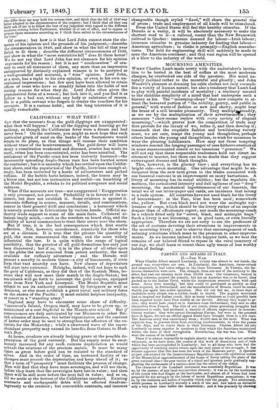ODD HABIT IN A LEADING STATESMAN.
IT may almost be said that Lord John Russell never gives a rea- son in support of his " opinion "; for he uses that word in the vulgar sense, to mean an impression which is not to be accounted for beyond its bare enunciation. For example, in the debate on the Irish Habeas Corpus Suspension Act, he said-
" I am told, ' you then [in 1846] opposed coercion, and you now propose it yourself.' It is quite true that I am liable to that charge. All I can say is, that I thought that bill was not adapted to the circumstances of the time—that coercion would be then not beneficial, but detrimental, to the interests of the country; and yet that measures which we have since brought forward, even though more severe than that was, have been adapted to the circumstances of Ireland, and were likely to be more beneficiaL But that, again, is entirely a matter of opinion. Those
who differ from me may hold the reverse view, and think that the bill of 1846 was better adapted to the circumstances of the country; but I think that all they can fairly ask of me is to follow the best of my judgment with regard to the different measures coming before Parliament, whether in or out of office, and to oppose or propose those measures according as I think them suited to the circumstances of
the time." Of course ; but how is it that Lord John cannot state the ele- ments of his opinion and the grounds of his judgment,—describe the circumstances in 1846, and show in what the bill of that year failed to fit them ; describe the different circumstances of 1849, and show in what the " more restrictive bill " does fit them better? We do not say that Lord John has not elements for his opinion orgrounds for his reason ; but it is not " condensation" of ora- tory to omit all statement of them, any more than an impression unsupported by distinctly explained reasons is to be accepted as a well-grounded and matured, a " wise" opinion. Lord John, as a man, has a right to his own opinion, or even to his own un- explained impressions ; but few men have been allowed to retain offices of trust who have so steadily fallen into the habit of not stating reasons for what they do. Lord John often gives the grammatical form of a reason ; but look into it, and you find it as hollow as a bad nut, without any body or substance of reason. He is a public servant who forgets to render the vouchers for his accounts. It is a curious habit ; and the long toleration of it is equally remarkable.























 Previous page
Previous page